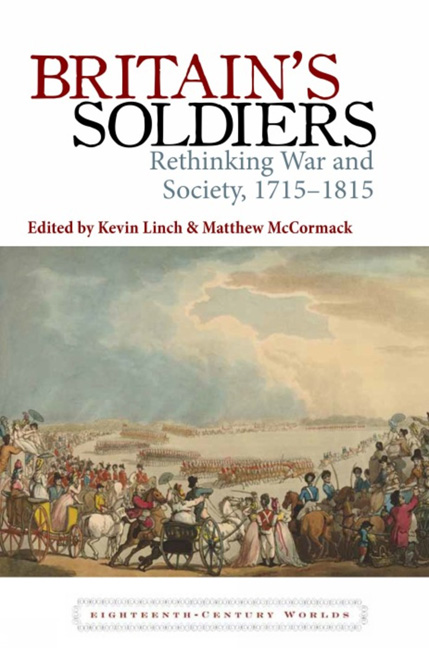Book contents
- Frontmatter
- Contents
- List of tables and figures
- Acknowledgements
- Notes on the contributors
- Introduction
- Part 1 Nationhood
- Part 2 Hierarchy
- Part 3 Discipline
- 5 ‘The Soldiers Murmured Much on Account of this Usage’: Military Justice and Negotiated Authority in the Eighteenth-Century British Army
- 6 Discipline and Control in Eighteenth-Century Gibraltar
- Part 4 Gender
- Part 5 Soldiers in Society
- Index
5 - ‘The Soldiers Murmured Much on Account of this Usage’: Military Justice and Negotiated Authority in the Eighteenth-Century British Army
from Part 3 - Discipline
- Frontmatter
- Contents
- List of tables and figures
- Acknowledgements
- Notes on the contributors
- Introduction
- Part 1 Nationhood
- Part 2 Hierarchy
- Part 3 Discipline
- 5 ‘The Soldiers Murmured Much on Account of this Usage’: Military Justice and Negotiated Authority in the Eighteenth-Century British Army
- 6 Discipline and Control in Eighteenth-Century Gibraltar
- Part 4 Gender
- Part 5 Soldiers in Society
- Index
Summary
AUTHORITY in the eighteenth-century British Army was far from absolute. Instead, the practical bounds of military authority were the result of give-and-take interactions between officers and enlisted men. For example, amongst the many complaints of ill-treatment levelled against Lieutenant William Catherwood of the 66th, was that he had shortened the men's rations unfairly, to which the men of his company ‘murmured much on account of this usage’. In response, Major William Coates, who commanded the regiment at the time, swiftly removed Catherwood from his post and installed a replacement, who restored the company's rations, ending the murmuring in the ranks. As this episode demonstrates, officers were sensitive to the thoughts and actions of their subordinates and responded to them, although they did not always do so in such a positive manner.
This chapter will examine the spectrum of tactics employed by soldiers to exert influence upon their officers in the execution of military justice. These approaches ranged from outright protest to fulsome co-operation, with various forms of negotiation accounting for the majority of interactions which ended in mutually beneficial solutions to problems. The records generated by the military justice process provide an unparalleled source to explore these disputes and interactions between officers and men. While a growing number of soldiers’ accounts have come to light over recent decades, few of these provide any penetrating commentary on their authors’ relations with their officers.
Officers’ diaries and correspondence tend to be similarly silent on the issue. In contrast, the records generated by the military justice process preserve significant details of the complicated interactions through which soldiers and officers negotiated the bounds of military authority. Previous commentators have interpreted enlisted men as the hapless victims of brutal officers. In contrast, this chapter will analyse common soldiers as active agents in a system whose structure shaped their options in ways that differed significantly from their civilian labourer counterparts.
PROTESTING MILITARY INJUSTICE
EXISTING SCHOLARSHIP on common soldiers’ protests has focused narrowly on instances of mutiny and desertion, but taking a broader view to include forms that hitherto have been overlooked provides a more detailed understanding of how these pointed acts of resistance could lead to negotiation.
- Type
- Chapter
- Information
- Britain's SoldiersRethinking War and Society, 1715–1815, pp. 95 - 113Publisher: Liverpool University PressPrint publication year: 2014



